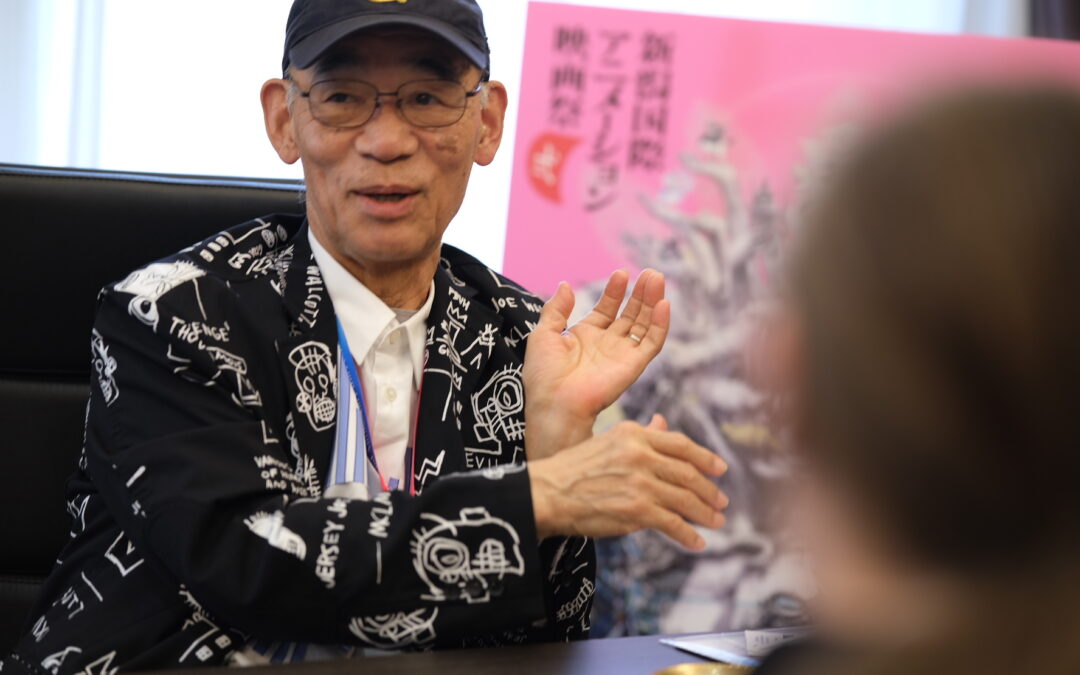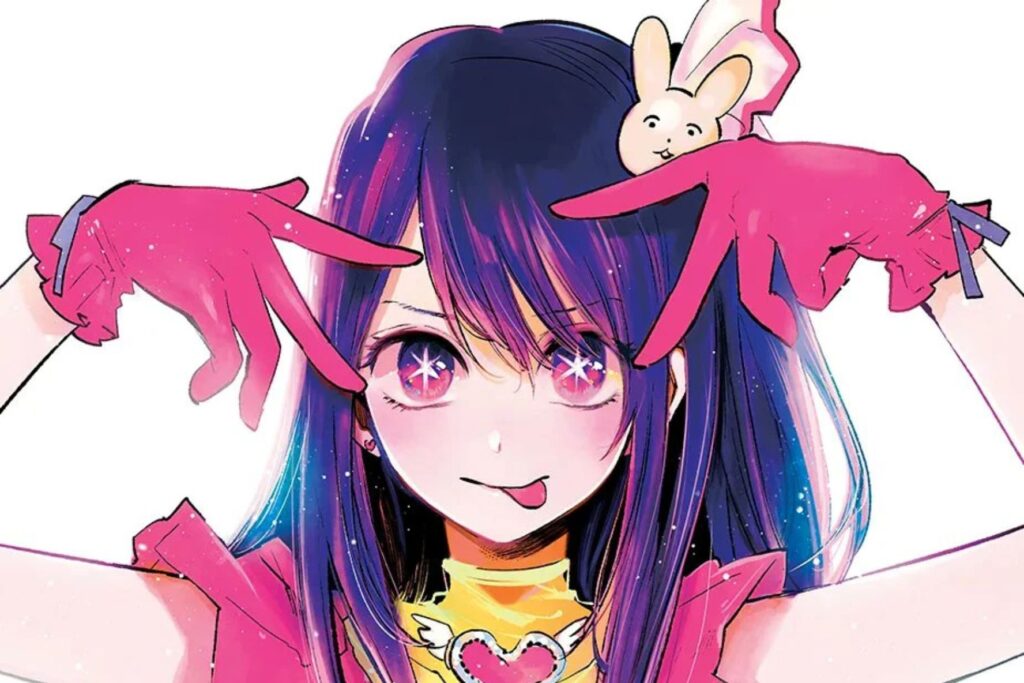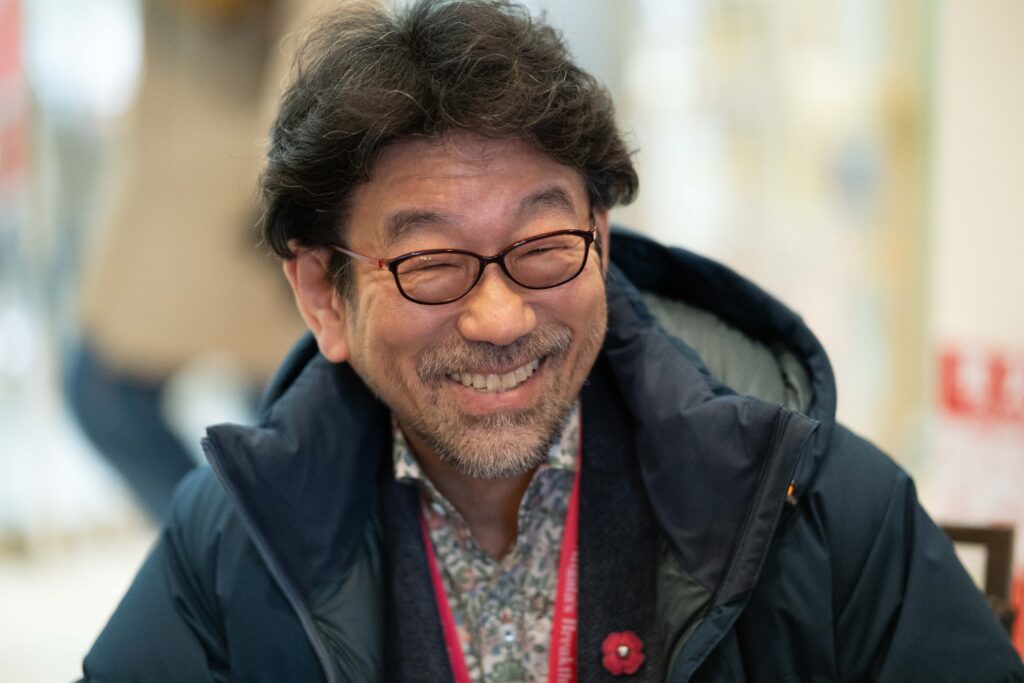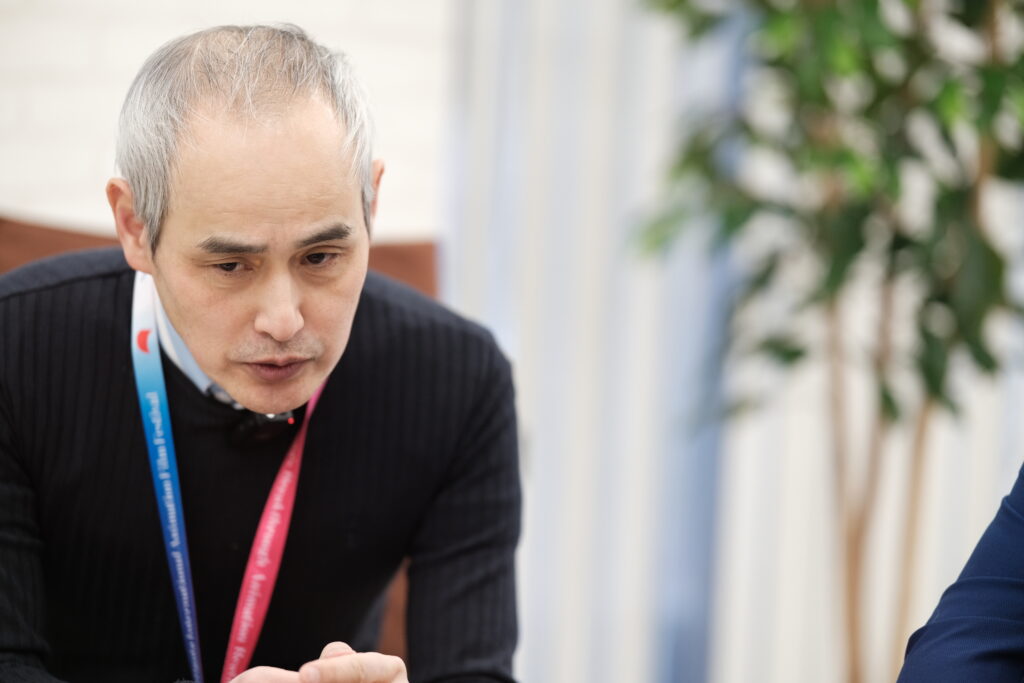Yoshiyuki Tomino is, without any doubt, one of the most famous and important directors in anime history. Not just one of the creators of Gundam, he is an incredibly prolific creator whose work impacted both robot anime and science-fiction in general.
It was during the second edition of the Niigata International Animation Film Festival that we had the opportunity to meet with such a legendary figure. It was quite the honor and a source of much nervousness, as Tomino is famous for his temper and bold opinions. But the person we met with was energetic and kind, happy to discuss his own work and his love of cinema with people from overseas.
This article would not have been possible without the help of our patrons!
If you like what you read, please support us on Ko-Fi! Get extra perks by subscribing to a monthly membership!
“Being in the same era as someone I’d never been able to surpass has become my incentive”
Mr. Tomino, I believe you’re extremely talented when it comes to creating fictional universes and stories, and yet you’ve kept doing robot series all your life. Why is that?
Yoshiyuki Tomino: That’s because I never got any other job.
You mean you never got any offers to do anything else?
Yoshiyuki Tomino: Yes. Also, I’ve always been aware that I basically don’t have what it takes to be an auteur. There’s this thing called the giant robot genre, and I thought it might serve as a good platform to create stories – and so I ended up joining a place that specializes in that kind of works. It’s not really what I aspired to initially, but considering my own abilities, there was no other way to go. That’s why the director Hayao Miyazaki has always been my enemy: being in the same era as someone I’d never been able to surpass has become my incentive.
But, even though you’ve created so many successful works, I don’t think you’ve ever had that much freedom at Sunrise. Why didn’t you ever try to go elsewhere?
Yoshiyuki Tomino: Certainly, Sunrise as a company isn’t a group of artists. It’s a group of producers. So for someone like me… Someone like me with such low artistic abilities could find support there. If I went to another studio, there would be other creators I couldn’t compete with.
But Miyazaki isn’t an artist, is he? He’s more like a craftsman, isn’t he?
Yoshiyuki Tomino: You’re wrong.
Am I?
Yoshiyuki Tomino: If he were a craftsman, he wouldn’t have done something like The Boy and the Heron. If you say he’s a craftsman, you don’t know anything. He’s an auteur. Look, he made an animated film without a happy end. That’s impossible if you do things half-heartedly. That’s why I don’t think I can compare with an auteur like that. Maybe Miyazaki would rather compare with someone like Victor Hugo. But that’s just for The Boy and the Heron. I don’t really like Miyazaki’s other works either way.
Miyazaki never does originals either.
Yoshiyuki Tomino: Right. But this time, he didn’t follow the original at all and made it something more like an autobiography.
He actually copied another novel besides How Do You Live?.
Yoshiyuki Tomino: I know. They haven’t hidden it or anything, so there’s nothing wrong with it. Anyways, most movies are adapted from an original work. There aren’t that many original movies.
What about your own works, especially things like Gundam or Ideon?
Yoshiyuki Tomino: I just made those because I’m not a full-fledged auteur. Someone with real creative abilities, unlike me, would never do something like Gundam or Ideon. You can’t just make robot series because you like robots. I’m pretty confident about that.
I’m changing the subject a bit, but talking about films, I’ve heard you were originally supposed to direct the Genma Taisen film…
Yoshiyuki Tomino: That’s a lie. (laughs) I’ve seen that story run somewhere, but I’m not the one who said such a thing. It’s just that I’m an acquaintance of the novel’s author, Kazumasa Hirai. We were acquainted, but when I found out who he really was, I realized I shouldn’t approach his work too much.
I suppose you both like occult and ESP-related things?
Yoshiyuki Tomino: That’s how some people see Newtypes, and actually, such groups approached me when Ideon came out. But they were mistaken. I admit the possibility that if you push this epistemology to its ultimate conclusions when considering such works, it might end up close to the occult. But this is actually just psychological theory rather than occult – I’m really not going in that direction.
But well, the thing with Ideon… (bitter laugh) There’s that last scene, right! It’s a procession of ghosts, and it might seem close to occult sensibilities. But that’s basically mistaken. In live-action you actually couldn’t do something like that. But in a medium like animation, which is just pictures, you have to go that far if you want to convey things, regardless of whether you believe in the occult or not. It’s more that I believe that things like ghosts are something we humans always long after.
In Ideon, I used the structure of giant robot series and tried the following out: if there were actually ghosts, let’s use them to conclude the story with a final twist. But today, there’s not one critic who sees Ideon that way. Nowadays, they just consider Ideon as any other robot show.
“When I was working on Ideon, I was sure I was about to lose my mind”
Actually, I have a question about that. The power of the Ide comes from Freud’s concept of “Id”, right?
Yoshiyuki Tomino: Of course it does. I mean, the name “Ideon” itself is just that, isn’t it? And yet, I’ve never met any animation critic who’s ever asked me that question. They just don’t see it.
Is that true?
Yoshiyuki Tomino: It is.
I don’t think any of my Japanese otaku friends know about it either, actually.
Yoshiyuki Tomino: They’re just not learned enough. I wish they’d at least read one book by Freud.
Did you read all of Freud’s works?
Yoshiyuki Tomino: I’m not that smart, you know! I just read a couple. (laughs)
Did you do any psychoanalysis?
Yoshiyuki Tomino: I did, by myself. To tell you what happened, when I was working on Ideon… particularly the movies. I was sure I was about to lose my mind. That’s how scary things were. I went so far in considering humans’ passions and psychology that I thought I’d want to kill myself. I was unable to overcome that state of mind. But I could thanks to the medium of animation. I could avoid annihilating my own physical existence in reality, because animation was a fantasy where I could put all of my thoughts about life and death. In that sense, I believe animation saved my life. Because it’s completely fake.
But, some years ago, I rewatched all of Ideon and I was quite surprised. The reason was, to put it in today’s words, that I had made something absolutely amazing… And I actually thought it was the kind of work that actually shouldn’t be made.
Really?
Yoshiyuki Tomino: I don’t think there are many movies that discuss complete annihilation so directly. I mean the relentless annihilation of all life.
When I was completing Ideon, I thought that, to put it in absolute terms, I absolutely did not want it to end in a Nietzschean world. When I thought about how to avoid such a result, I came up with that ending: it would be visually beautiful, and it wouldn’t come too close to reality. Because I had anticipated this final scene, I could portray complete annihilation without any reservation in the lead-up. I often receive criticism for it, such as, “why did you show such a young child getting its head blown off?” – because without it, the ending wouldn’t work.
I mean, why is it alright when adults do it to each other, but as soon as it’s a child getting its head blown off, you people start whining about it? That doesn’t make any sense. I mean, I made Ideon with the intent of portraying the complete reality of what the idea of “war” is. I believe that, if Putin had seen that scene, he wouldn’t have gone to war.
(laughs) Going back to Freud for a minute, where did you discover his ideas? Was it through Forbidden Planet?
Yoshiyuki Tomino: I didn’t think Forbidden Planet would come up! (bitter laugh) I started Freud with The Interpretation of Dreams in high school, but I’m not that knowledgeable about his theory of psychoanalysis. But I’m surprised that you’re even bringing up the two together… Why are you asking about Forbidden Planet?
Because I love SF. It’s a masterpiece – just like Ideon.
Yoshiyuki Tomino: It is, but you know, that ending – there’s no lead-up whatsoever, it’s just pure disrespect for the audience. I wanted to properly resolve it, and so I made Ideon that way. I love Forbidden Planet, but only until that Id story comes up. There’s a scene where the Id melts an iron wall – I really hate that shot.
Is that so?
Yoshiyuki Tomino: Yes. The moment when the iron wall melts because of the heat, the way the wall feels – it’s bad! It has to collapse for real! (laughs) You just made me remember how bad it was! (laughs)
Anyways, the Id is a very complicated question, and it’s undeniably The Forbidden Planet which taught me how to visually represent all the appetites at the core of human psychology. It really taught me! If I didn’t have the memories from it, I certainly couldn’t have made Ideon. But as I just said, for that last scene, I kept asking myself how far I could go in realism. And I thought I had to include real massacres – basically go all the way. That’s why it shows people getting shot right in the face, and that’s why people criticize me. There’s no such thing in Forbidden Planet… I’d forgotten about it… Thinking about it now, I feel bad that I’ve been so influenced by Forbidden Planet. (laughs)
“Entertainment is about liberating the audience while making them have fun”
You talked about happy endings earlier, do you feel like you have to make some as well?
Yoshiyuki Tomino: No, well, what I think when watching films is – I used to like sad films and films that adhered to realism at some point, but such films really aren’t fun at all. Even when they show naked women, I feel like, “is that what realism is all about?!” (laughs)
That’s how Ideon became that way. There’s nothing more to it. (laughs) In that sense, cinematographical works are just like theater in a way, and the basic idea might just be to sell sadness. Making the audience cry creates this psychological purification called catharsis; I acknowledge that this exists. But when considering what entertainment is… I guess I just remembered this crazy thing. (laughs)
What is it?
Yoshiyuki Tomino: Once, when I went to France, I went to the Crazy Horse [1] in Paris. And it was great! (laughs) I realized that entertainment is about liberating the audience while making them have fun. That’s why I hate robot series which are just about a monster destroying everything. There’s a minimal set of rules you have to follow. If you ask me what that is, I believe it’s about setting the priorities straight: considering the time period, whether or not you want to acknowledge or dismiss ethnic and cultural differences…
I’m really not watching a lot of movies lately, but a film has made me think that you can go very far in fantasy even with live-action nowadays, so there are lots of things you can do – that’s Poor Things. So it’s ok to go that far? – is how I felt.
Also, I haven’t seen Oppenheimer yet, though, but I understand what it’s going for. It feels like that guy’s finally become a full-fledged director. But Oppenheimer isn’t fun. It’s not fun, but I think that approach of trying to grasp reality is the right one. Movies hold a very strong ability to produce statements, or should I say to create messages or even propaganda. That’s why right now, the Japanese mistakenly think that Oppenheimer is about the atomic bomb.
Which is why it’s taken so long to release in Japan.
Yoshiyuki Tomino: Yes. The distributors must have thought it was an awful film, but that only shows they didn’t look up anything about it. Basically, it’s about people. Regardless of Oppenheimer’s genius as a physicist, in the end, after the war he was rejected by society. The reason is that he became unhappy after he had to take the spotlight regarding issues related to the military and weapons of mass destruction. The fact that the film industry is finally able to tackle such a subject makes Oppenheimer a valuable film in my opinion.
War is an important theme in your works as well. Most of your works appear anti-war, but looking at them more closely, they also acknowledge the necessity of using violence.
Yoshiyuki Tomino: That’s true.
War is bad, but sometimes violence is necessary – do I get it right?
Yoshiyuki Tomino: Well… I’ll acknowledge that belief in the importance of violence is, for me, one of the foundations of my work. But the other thing is that film is basically spectacle – which is to say, action. So the story itself has to be dynamic, it has to be active. So it needs speed and destruction.
But as I said earlier, I don’t like monster films. Some films just show one-sided destruction. And the people producing these films are ok with it. But what are they thinking? Are they even thinking about the drama? There are lots of films like that. Films are entertainment, but it’s also necessary to consider them as a medium that can convey drama. So I don’t really understand why the people who like action, monster or war films can just be satisfied with battles. But well, I have to admit they exist. After all, I can’t ignore how many battle scenes there are in my works. (laughs)
And the thing is that wars won’t end, will they? It’ll be like the Gundamseries, going on forever…
Yoshiyuki Tomino: Well, you know, Gundam isn’t just about war: another thing I was trying to do was considering whether mankind can live forever on a finite planet such as Earth, and try to put some realism into it already. Basically find the words for it.
Just 2 or 3 years before Gundam started, The Club of Rome started saying that, in 80 years, oil on Earth might run out and the idea that the Earth is finite emerged. Even this year, in the statements they release, they’re using such words, but none of that reflects in actual policies – in that sense, we’re all like these stupid politicians. I’m also including religions in that lot.
Because I’m working in the genre called animation, I can say such things – it’s time to be aware of these things, we can’t ignore them anymore. You can’t say such things when you’re bound by realism.
Talking of all that, I’m curious about the human bombs in Zambot 3. Were they inspired by the Lod Airport Massacre, by any chance?
Yoshiyuki Tomino: People carrying bombs was a thing that already took place during WW2 in Japan, so I wouldn’t say I particularly intended to reference the Lod Airport Massacre. Also, in older Japanese history, there’s the Bakudan Sanjûshi – three soldiers who made a suicide bomb attack.
Since I knew about all that, human bombs weren’t anything special – though doing such a thing in a kid’s show got the studio angry at me, saying it was awful. They got angry at me, but I thought it was crazy to show so many destruction scenes in robot anime and not get into such a topic. For me, it was just natural, but doing what seemed natural got me being called militarist, right-wing, nostalgic of Imperial Japan, even though it’s the contrary. Rather, it’s that when I truly understood what “destruction” is, I needed to properly portray topics where destruction is a fundamental element. I’d like to talk about Gundam now, but it seems there’s no more time! (laughs)
“Maybe you can’t be a film director without a clear sense of where you’re going”
Sorry. (laughs) To conclude, I’d like to ask about your style. I believe it changed a bit over the course of the 80s. Before that, you used to show things more directly, but you started including increasingly surprising dialogues, cutting the transition between shots… I’ve always wondered if you maybe weren’t influenced by the French Nouvelle Vague, particularly Godard [2] .
Yoshiyuki Tomino: I haven’t seen a lot of Godard. I just absolutely love his first film, Breathless. I recognize Godard’s special talent, so it would be hard to say I wasn’t influenced… But the fact is that I don’t really like the overall direction of the Nouvelle Vague. The reason for that is that you can see the director’s – that is the auteur’s – ego all over, which is a bit too individualistic when you consider what I previously said about entertainment. So in that sense maybe you could say I don’t like it.
But there’s one thing that clearly had an influence on me. That’s the French actress Jeanne Moreau [3] . Especially in Elevator to the Gallows. She always turns me on so much, I love her! Also, Jeanne Seberg in Breathless – she’s American, but I love her too! (laughs)
If you ask me why so many auteurs have appeared in France, I would say that comes from the French national spirit. The thing that got me thinking about it was when I was looking into the French Revolution and why it happened that way. There’s the relationship between the high nobility and the people, and also why the nobility built themselves such huge palaces – it seems that the reason is that the French basically don’t look at the common people around them. Also, there isn’t just one type of French people: people are really diverse, you could even say that “the French” don’t exist. That’s the conclusion I came to. Basically, it’s a place where people blend: it’s where people from all over Europe gather, and so everybody just had to come up with their own ways to survive.
But there was one individual I truly didn’t understand. That’s Robespierre. I don’t understand how it’s possible to have absolutely no limits on your self-righteousness like he did. I really don’t get it. I don’t get it, but it made me understand one thing about Putin: if Putin knew about Robespierre, he would never have invaded Ukraine.
When I tried to understand what was behind such carelessness, I thought that it might be that, when you’re ruling over so many different ethnicities, you have no choice but to follow your own instinct – quite a cruel fate…
I guess Putin should have watched Victory Gundam, then…
Yoshiyuki Tomino:
That’s true!… But you know, beyond Gundam, I’ve always worked by putting all the things I think about – like I just said – in my works. To be perfectly honest, that’s how I could make giant robot series for 20 years without getting sick of it. But, after 20 years, I realized it was only war stories and that I was too old for it – I finally grew tired of it, of war stories. I spent another 20 years wondering what I could do instead, and that’s how I came to create something like Reconguista in G, which brings us to today. And now, I’ve started realizing that I’ll die, so I want to create at least one more series before that, but I have no idea what I’m able to create.
What I’ve just talked about here just came out by itself. I might have said I hate Godard, but as embarrassing as it might be, I always watch his first film, Breathless, at least once every ten years. (laughs) I don’t know why – it’s poorly made, including that pathetic last scene, but who cares? I like it. In that sense, I like it much more than Forbidden Planet. Basically, both Jean Seberg and Jean-Paul Belmondo [4] are incredibly sexy, and they’ve got a wonderful way to talk. That makes me think that maybe Godard wasn’t entirely wrong. He was too smart, so he went to rather intellectual places, but he’s always liked women! And so if he liked women that much, why did it become that way? Basically, what I don’t like is that he became a big director.
(laughs)
Yoshiyuki Tomino: Am I wrong?
I completely agree with you.
Yoshiyuki Tomino: Anyways, I did not expect to talk about that today. I just mentioned Elevator to the Gallows, and I love this film, but it’s the film that Louis Malle made afterwards, Zazie dans le Métro, that made me realize how difficult being a director is. What I mean is that, after making such a simple love and criminal drama, Malle kept directing and kind of lost his aim. That’s pretty tough. To be a director, you have to have a clearly defined orientation. That’s what I learned from Louis Malle: maybe you can’t be a film director without a clear sense of where you’re going. That’s it for Louis Malle…
Which reminds me of another film I like! Is it alright? (laughs) It’s Amélie! I love that one! (laughs) It really left a huge impression on me. Just as strong as the one Jean Seberg left. That’s what movies are all about – but I’m not talking about Gundam at all, am I? (laughs)
No problem. It was very interesting, thank you very much for your time.
Yoshiyuki Tomino: I should be the one saying this! That was very stimulating. As I said, I never got to talk about all of this with foreign fans! Also, we agreed on a lot of things, and you helped me remember what I forgot, so thank you very much.
Actually, an animator friend of ours told us that, if we were to interview you, we had to get you angry. I’m terribly sorry as it seems that we failed.
(everybody laughs)
Yoshiyuki Tomino: I’m not that young anymore, you know. I’ve softened up with age!
NOTES
[1] Crazy Horse. Parisian cabaret set in the center of Paris since 1951, famous for its nude stage shows featuring female dancers.
[2] Jean-Luc Godard (1930-2022). French live-action director and film critic, considered as one of the most influential and important filmmakers of all time. Challenging conventions of both Hollywood and French cinema, he is one of the leading figures of the French New Wave. Most famous works include his first feature, Breathless, Contempt or Pierrot le Fou.
[3] Jeanne Moreau (1928-2017). French actress and singer. One of the leading actresses of 1960s French cinema, she made her breakout in Louis Malle’s Elevator to the Gallows. She also played with major directors of the time, from François Truffaut to Orson Welles.
[4] Jean-Paul Belmondo (1933-2021). French actor. One of the most important figures in French cinema from the 1960s to the 1980s. Initially very close to the New Wave, he played major roles in Godard’s films. By the late 1960s, he became one of the most famous actors in France and a popular icon.
All our thanks go to Mr. and Ms. Tomino for their kindness and enthusiasm, and to the Niigata festival staff, particularly Cathy and Ms. Akita for their support and assistance. We also thanks Mr. Hisashi Maeda for his help in the editing of the Japanese-language version.
Interview by Ludovic Joyet and Matteo Watzky
Translation, introduction and notes by Matteo Watzky
Like our content? Feel free to support us on Ko-Fi!
Oshi no Ko & (Mis)Communication – Short Interview with Aka Akasaka and Mengo Yokoyari
The Oshi no Ko manga, which recently ended its publication, was created through the association of two successful authors, Aka Akasaka, mangaka of the hit love comedy Kaguya-sama: Love Is War, and Mengo Yokoyari, creator of Scum's Wish. During their visit at the...
“Film festivals are about meetings and discoveries” – Interview with Tarô Maki, Niigata International Animation Film Festival General Producer
As the representative director of planning company Genco, Tarô Maki has been a major figure in the Japanese animation industry for decades. This is due in no part to his role as a producer on some of anime’s greatest successes, notably in the theaters, with films...
“The Niigata festival aims to include everything, from art to entertainment” – Tadashi Sûdo Interview
During our time at the second edition of the Niigata International Animation Film Festival, we had many encounters and reunions. Among those was Mr. Tadashi Sûdo, whom we were used to seeing at the Annecy Animation Festival. While maybe not well-known to the...





Tomino is God. G-O-D!
Always a pleasure to have news from tomino